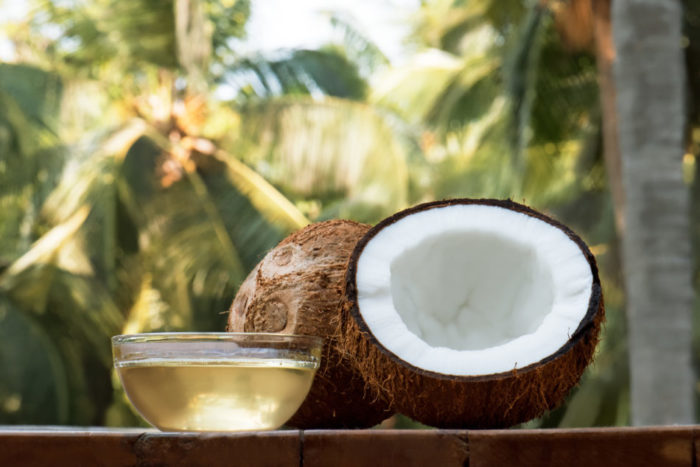
Coconut oil is a staple in several regions of the world. Given its versatility and wide uses, its popularity has increased and the oil is now available all over the world. It’s used for cooking, baking, and as a butter substitute in a lot of vegan foods. But what if you need a substitute for coconut oil?
Well, we’ve got you covered with some great options! Coconut oil has a unique flavor and taste, so substitutions have to consider these factors too.
The oil is extracted from the flesh of mature coconuts and can be refined or unrefined. Coconut oil melts at around 75°F. If you live in a cooler climate, you might see coconut oil as a butter-like solid, rather than oil.
Many of these substitutes are general and easily available. Let’s take a closer look!
Top Alternatives For Coconut Oil In Baking
1. Olive Oil

You can substitute coconut oil for olive oil in most recipes. It’s a simple and common substitute that matches well with most recipes. However, avoid its use for recipes since the oil’s flavor will seem overpowering.
When using olive oil, it’s best to stay with low heat or no-heat cooking. The oil has a low smoking point and won’t work well for frying or baking needs.
On the other hand, you can go to town with olive oil when using it for salad dressing, soups, and similar recipes. The recommended replacement ratio is 1:1, but it’s okay to make adjustments based on your preference.
2. Butter
Butter is often seen as an ideal alternative to coconut oil. It is solid at room temperature (like coconut oil) and provides an excellent taste and texture to food. It’s a favorite for baking recipes, where it adds to the taste and texture of the dish.
This is the most convenient alternative. It is easily available and works great with most recipes and dishes. It might perhaps even be better than coconut oil for some baking recipes. I love the coconut flavor but the texture and mouthfeel butter brings on a whole different level.
3. Avocado Oil

The neutral-flavored avocado oil is a good option to replace coconut oil. It’s also a more expensive option. Nevertheless, it’s good for your recipes and is generally considered a healthier option. It’s a good substitute for many requirements, although it’s best suited if you want a vegan option for your recipe.
Use avocado oil as a substitute for similar quantities of coconut oil. It has a high smoking point, so you can use it for cooking and baking.
4. Sunflower Oil

Sunflower oil is milder than coconut oil and has a largely neutral flavor. It also has a high smoking point, which makes it useful for high-temperature cooking, including frying. The oil is generally seen as nutritious and healthy. It is rich in vitamins and antioxidants.
Replace coconut oil with sunflower oil in a 1:1 ratio. It is great for frying and baking, and will add a good texture to your muffins and breads.
5. Grapeseed Oil
Grapeseed Oil is milder and has a high smoking point. Most of its qualities are quite similar to sunflower oil. I believe the larger difference between both these oils is their availability and general cooking preference for most people.
You can replace coconut oil with grapeseed oil in a 1:1 ratio. This oil is quite versatile and will find use in frying, baking, salads, dressings, and more.
6. Hemp Oil
What’s the first thing most of us think of when we hear hemp oil? Cannabis! Well, that would be an incorrect assumption. Hemp and cannabis come from different plants, though both plants belong to the same family.
The psychoactive compound tetrahydrocannabinol (THC) level in cannabis plants can be up to 28%. For hemp, this number is lower than 0.3%. Long story short, this means hemp has no uses as a psychoactive, though it is often used for medicinal purposes.
However, due to its association with cannabis, hemp seed oil is not as easily available and also tends to be more expensive.
Hemp oil is a healthy and useful alternative. It contains fatty acids like linoleic acid, alpha-linolenic acid, and gamma-linolenic acid in a 3:1 ratio. This composition is generally seen as healthy for human consumption.
It has a low smoking point, so avoid its use for frying or baking. You can use hemp oil in salad dressings, marinades, and sauce. I would recommend giving it a shot with hummus.
7. Almond Oil
Almond oil is a flavorful and expensive replacement for coconut oil. If you’re willing to spend the money, almond oil is useful for most requirements. It has a high smoking point, so feel free to use it for frying, baking, and other dishes.
This is not a mild oil, so be prepared for the nutty almond taste if you choose to go with this option. On the plus side, this works very well with baking, especially cookies. The unique flavor of almond oil adds a depth of taste and texture to these recipes.
8. Hazelnut Oil
Hazelnut oil is an interesting choice. It is sweet and fragrant and has its own unique flavor. The oil has a high smoking point, so you can use it for frying, baking, sauces, marinades, and more. Of course, whatever you choose, do keep in mind the unique flavor of hazelnut and how it will match with your dish.
Cookies can benefit from hazelnut oil. Maybe some bread and cakes as well. In fact, baking is where the true talent (flavor) of this oil truly shines. There are a lot of monounsaturated fats in this oil, so it keeps on the side of being a relatively healthy option.
9. Applesauce
Applesauce is a popular baking fat substitute. It is often recommended as a butter and oil substitute, though many chefs see it perform better as an oil substitute. Use it when you’re very interested in lowering the calories for baked goods.
Moist and dense dishes like banana bread and fruity muffins can benefit from the use of applesauce and the lowered calorie count. For other dishes, you’ll have to consider handling the moisture applesauce brings to the mix.
Applesauce can substitute coconut oil in a 1:1 ratio. Use it in the same quantity, but remember to make adjustments. For baking needs, make use of unsweetened and unflavored applesauce.
What Is Coconut Oil And Is It Healthy?
As its name implies, coconut oil is derived from the flesh of mature coconuts. It is versatile and very popular around the world. Various cultures have been using this for a very long time and for a long list of uses. You could use it as hair oil, skin moisturizer, cooking oil, flavoring agent, and a lot more.
Countless people will swear up and down on the health benefits of coconut oil. But is it really healthy?
A study at the University of Cambridge suggests that coconut oil may help lower the risk of heart disease and also function as an anti-inflammatory. The study found coconut oil to be a better alternative to butter or similar options.
Apart from these scientifically verifiable facts, there are claims by diet gurus and such about the positive effects of coconut oil. These include aiding digestion and providing an energy boost for the brain.
So, is it time to gorge on coconut oil? No, not really.
Coconut oil is full of saturated fats. It’s best to limit your intake of fats like these. Coconut oil is healthier than comparable options like butter, but it isn’t something to chomp on without a care in the world.
FAQs And More On Coconut Oil And Its Alternatives
Substitute For Coconut Oil In Baking
Plenty of options and oils can substitute for coconut oil in baking. Ideally, we want something with a high smoking point and a good flavor to match the deliciousness of coconut. The high smoking point ensures that the oil won’t burn under the heat and the flavor adds icing to the proverbial cake.
Some reasonable choices here are almond oil and hazelnut oil. Both of these will add their delicious flavoring to baked goods. Plus, they are relatively healthy and have high smoking points, so there won’t be a problem with cooking.
Other worthy alternatives include butter and avocado oil. Both of these are mild options and don’t bring a strong flavor to the baked goods. But they do contribute to good texture and mouthfeel. Butter especially provides a wonderful touch for taste and texture.
Substitutions For Coconut Butter
Coconut butter, also known as creamed coconut, is made from the dehydrated pulp of coconuts. It’s creamy, flavorful, and quite delicious. Useful substitutions for coconut butter include peanut butter, almond butter, and cashew butter. Of course, these butters should be creamy, not crunchy. Another notable substitute is middle-eastern condiment tahini.
Learn more: Best Almond Butter Substitutes For Your Culinary Pleasure
Can I Use Olive Oil Instead Of Coconut Oil?
Olive oil is an excellent substitute. Many cooks prefer extra virgin olive oil, though any olive oil can work as a substitute. Olive oil is best used in soups, salads, and similar recipes. Due to its low smoking point, avoid using olive oil for baked goods or frying.
Where replacement is possible, use equal amounts of olive oil as you would coconut oil.
Is Creamed Coconut The Same As Coconut Butter?
Yes, the terms creamed coconut and coconut butter mean the same thing and are often used interchangeably. There are several other similar terms as well, including coconut mousse, coconut paste, and coconut flesh. There’s no reason for it to have so many names, but hey, I guess it works just fine!
So What Can Successfully Replace Coconut Oil?
The unique flavor of coconut is impossible to mimic by conventional substitutes. However, its use and function in recipes can be appreciably copied. Butter is an excellent substitute for coconut oil. Other notable substitutes include almond oil, olive oil, and several others listed here. Those who consider counting calories as their top priority should look at applesauce as a substitute.